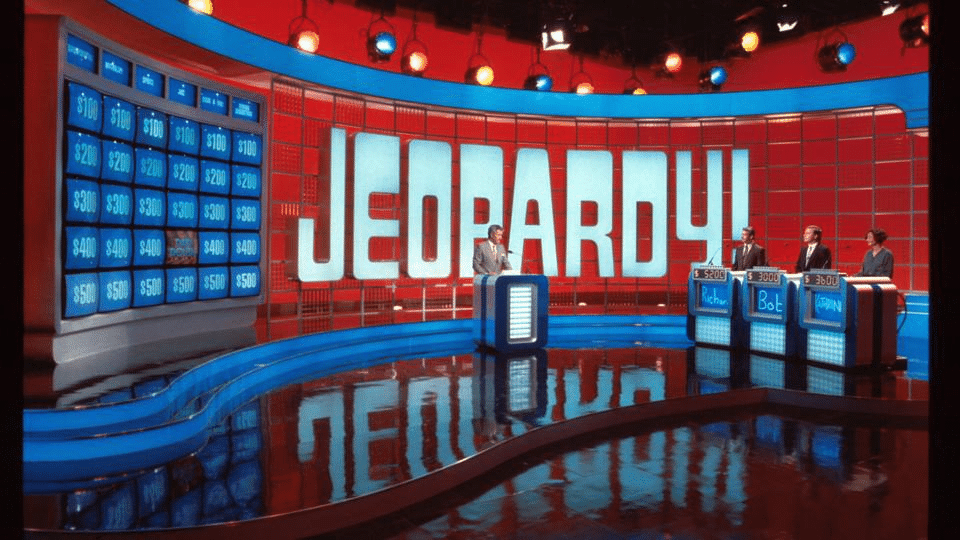By Adam Nedeff, researcher for the National Archives of Game Show History
If you were watching Jeopardy! on June 23, you saw a game that ended with a strange coincidence. The Final Jeopardy! clue:
In 1896, the Vassar-educated wife of this man wrote, ‘Thousands of dollars may be paid for a copy of Shakespeare’
Contestant Emily Croke was the only one who wrote the correct question: “Who is Folger?”
After being declared the winner, Croke revealed to host Ken Jennings, “That was my great-great-great-aunt Emily.” Croke was named after her.

How could this possibly happen? Is it just a coincidence that she wound up with a Final Jeopardy clue about her own family?….Well, yes, it is. That coincidence involves a rarely discussed but very important aspect of a typical taping day on most game shows: a process called randomization.
Harry Friedman, the executive producer of Jeopardy! from 1997 to 2020, helpfully explains how the process works for that show:
“For each five-episode tape day, the writers would prepare six complete 61-clue games. Each game included a Jeopardy! round, a Double Jeopardy! round, and a Final Jeopardy! clue. Each game was assigned a unique five-digit number.”
Overseeing each tape day is Sullivan Compliance, an independent third-party company that specializes in game show production oversight. The firm supervises all aspects of production to ensure that each game is played honestly and fairly, and that no contestant plays with an advantage or disadvantage. (A representative of Sullivan Compliance, Alan Gerson, recently sat down for an oral history interview for the National Archives of Game Show History.)
Friedman continues, “At 6 a.m. on tape day, the head writer would call a representative from…Sullivan Compliance and provide the six game numbers. The Sullivan representative would then randomly select five numbers. The games corresponding to those numbers were the ones played that day. No other information about the games was shared. The unused sixth game became a ‘rollover’ and was set aside for future use.”
“The order in which the five selected games aired was determined by the head writer. This allowed for flexibility to ensure that a category tied to a holiday or special event could air on the appropriate date.”
Some shows prepare even more game material in advance. For many of Game Show Network’s original series, the writers prepare 65 full games of material before each season has even started recording. For each tape day, seven of those 65 games are used for a random drawing. Six episodes will be taped, meaning that six out of those seven games are drawn, and the seventh goes back in the pool with the other batches of material written for that season. And many game shows don’t even grant the head writer the flexibility that Friedman mentioned. For most game shows that tape multiple games in a day, the order in which the games are drawn is the order in which they will be played.
Friedman continues, “Alex Trebek typically arrived at the studio shortly after 6 a.m. to carefully review all five games. At 8 a.m., in the Jeopardy! library, Alex and I would be joined by a team of producers, writers, researchers, and a Sullivan Compliance representative for a final review of the day’s material. During this session, we addressed issues such as pronunciations, factual accuracy, clarity, and the acceptability of alternate responses.”
“No information about contestants was ever shared with the writing or research teams at any point. The two new contestants who would face the returning champion were selected randomly by the contestant team in a secure area backstage between episodes.”
That’s typical operating practice for game shows. The staff in charge of the game content and the staff in charge of conducting tryouts and booking contestants do their work separately. This isn’t to say they’re isolated, or that they aren’t allowed to speak to each other. There’s just simply no overlap. On most game shows, a contestant booker will never tell the writers, “We booked a history professor, so try to have a category about the Civil War.” The exceptions to this are games like The Floor, in which a contestant’s field of expertise is relevant to the game. For a show like that, the material is written according to the contestants’ perceived strengths.
To summarize, multiple batches of game material are prepared for every taping session, and a random drawing determines which game will be played by which contestants. Because of the sheer number of games that are taped, and the amount of material that those games use, coincidences can and do ultimately happen. A clergyman winds up with a category about the Bible, or a surgeon gets a shot at Anatomy. In Jeopardy!’s long history, Emily Croke isn’t even the first contestant to get a clue about a famous relative. In 2001, contestant Bill O’Donnell, asked to identify the inventor of the Ferris wheel, caught Alex Trebek off-guard by ringing in and responding, “Who is my grandfather?”


